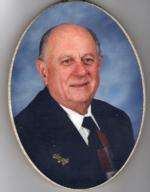Robert L. Frye
| Robert Lafayette Frye | |
|---|---|
 | |
| Born |
January 9, 1927 Shongaloo, Webster Parish Louisiana, USA |
| Died |
February 4, 2011 (aged 84) Springhill, Webster Parish |
| Residence |
(1) Hammond |
| Alma mater | Louisiana State University |
| Political party | Republican candidate for Louisiana Superintendent of Education (1972) |
| Religion | Baptist |
| Spouse(s) | Bettye Elmore Frye (married 1945-his death) |
| Children |
Robert Randal Frye |
Robert Lafayette Frye (January 9, 1927 – February 4, 2011) was an educator and politician from the U.S. state of Louisiana.
Early years and education
Frye was born to Jennings Bryan Frye, Sr. (1896–1970), and the former Fannie Mae Coyle (1900–1994)[1] in Shongaloo south of Springhill in Webster Parish in northwestern Louisiana, where at the age of sixteen he graduated from Shongaloo High School. He enrolled in Louisiana State University in Baton Rouge, from which he received in 1966 his Ph.D. in education. On October 6, 1945, Frye wed the former Bettye Elmore (also born 1927), and left for stateside service in the United States Army two months after the conclusion of World War II.[2]
His career began as a teacher/coach at Reeves High School in Reeves in Allen Parish in south Louisiana. He returned to his native region as a principal in three Webster Parish schools located in the Evergreen community north of the parish seat of Minden, Dubberly, and his native Shongaloo.[3] He took sabbatical leave from Shongaloo in 1963 to work on his doctorate degree.[4] Frye advanced to the Louisiana Department of Education in Baton Rouge and finally to Southeastern Louisiana University in Hammond, where he also served prior to 1990 on the elected Tangipahoa Parish School Board.[2]
Campaign for state superintendent
In 1972, Frye sought the then elected, and since appointed, position of Louisiana state education superintendent. He won the Republican nomination over Otis Romaine Russell, 8,245 (81.4 percent) to 1,889 (18.6 percent).[5] Russell is a former controversial Baton Rouge Teamsters Union attorney, who later confessed in 1980 during his legal disciplinary hearing to mental illness.[6] This was the last closed primary held for state and local offices in Louisiana because the state switched to the nonpartisan blanket primary four years later.
Frye had expected to face the two-term Democratic incumbent, Bill Dodd, but Dodd was instead unseated in the party primary in 1971 by Louis J. Michot of Lafayette,[7] a businessman, former state representative, and member of the State Board of Education. Frye ran against Michot on the GOP ticket headed by gubernatorial standard-bearer David C. Treen, then of Jefferson Parish in the New Orleans suburbs, who was opposing Edwin Washington Edwards. Other Republicans running statewide in the February 1, 1972, general election were former State Representative Morley A. Hudson of Shreveport, nominee for lieutenant governor and Tom Stagg of Shreveport, candidate for state attorney general. All of the statewide Republican candidates went down to defeat, but Treen led his party slate by polling 42.8 percent against Edwards, winner of the first of his four nonconsecutive terms in the office.[8]
After Michot unseated Dodd, Frye telephoned him to offer congratulations. A few weeks later, Frye alleged that Michot, along with a brother, was operating a bar in Lafayette. Frye also claimed that Michot had offered him a high level job in a new Michot education department if Frye would withdraw from the general election contest.[9] Michot denied the charges[9] and easily prevailed, 662,597 votes (63.5 percent) to Frye's 380,896 (36.5 percent).[8] At the time Frye challenged Michot, the Republican Party in Louisiana numbered fewer than 38,000 registrants in the state; Frye henced polled ten times the votes of his own party base.[10] Frye lost both his native Webster Parish as well as Tangipahoa, one of the Florida Parishes, where he was residing at the time of that campaign. Frye polled majorities in East Baton Rouge Parish and five north Louisiana parishes: Caddo, Ouachita, LaSalle, Lincoln, and Winn, the former stronghold of the Long political faction.[8][11]
Death and family
Years later, Frye retired to Springhill, located just south of the Arkansas state boundary. He died at the age of eighty-four. In addition to his wife, he is survived by four children, Robert Randal Frye (born 1947) of Tulsa, Oklahoma, Bettye Rene Frye (born 1951) of Baton Rouge, Deborah Jean Frye Ferachi (born 1952), and husband, Kenneth Raymond "Kenny" Ferachi (born 1950), of Plaquemine in Iberville Parish south of Baton Rouge, and Kevin Dale Frye (born 1957) and wife Janice of Benton in Bossier Parish; a sister, Nona Rhea Walker (born 1920) of Baton Rouge; six grandchildren, and ten great-grandchildren.[2] He was predeceased by his brother, Dr. Jennings Bryan Frye, Jr. (1918–2005), of Baton Rouge.[1]
Frye's obituary describes his "greatest pride as the children he knew and educated in schools and colleges." Frye's funeral services were held on February 7, 2011, at his home church, the First Baptist Church of Springhill. Interment followed in Springhill Cemetery.[2]
References
- 1 2 "Social Security Death Index". ssdi.rootsweb.ancestry.com. Retrieved February 6, 2011.
- 1 2 3 4 "Robert L. Frye". Baton Rouge Morning Advocate, February 6, 2011. Retrieved February 6, 2011.
- ↑ Minden Herald, September 11, 1958, p. 1
- ↑ "Strong Named Principal at Sibley High School", Minden Herald, August 8, 1963, p. 1
- ↑ Louisiana Secretary of State, Recapitulation, Republican Primary Election, November 6, 1971
- ↑ "Disciplinary Hearing: O. Romaine Russell". ladb.org. Retrieved February 6, 2011.
- ↑ Coincidentally, Frye's middle name was "Lafayette", and his opponent was from Lafayette, Louisiana.
- 1 2 3 Louisiana Secretary of State, February 1, 1972, general election returns
- 1 2 "Frye Released Papers Say Michot Unethical", Minden Press-Herald, January 27, 1972, p. 1
- ↑ State of Louisiana, "Statement of Registered Voters as of January 1, 1972," (Baton Rouge: Secretary of State, 1972).
- ↑ Billy Hathorn, "The Republican Party in Louisiana, 1920-1980", (Natchitoches, Louisiana: Northwestern State University, 1980), p. 203